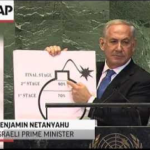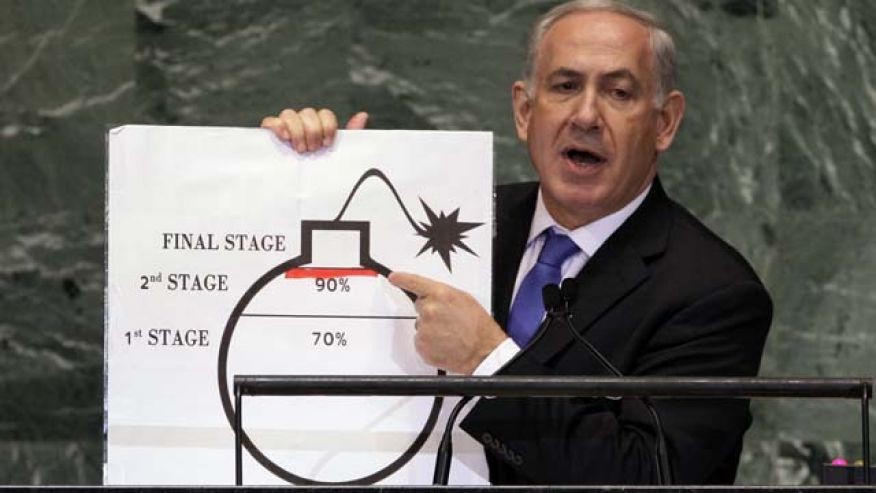We are entering a dangerous period during which the Middle East may become embroiled in a nuclear war between Israel and Iran—and consequences from that war could extend well beyond the Middle East, even to America with existential implications. Unless something happens to persuade Congress to block President Obama’s “Deal with Iran,” such dire events could follow shortly. And time is running out.
Hopefully, our representatives get an earful during their Congressional Recess about the danger they court if they approve President Obama’s terrible deal that falsely alleges to block Iran’s path to nuclear weapons. Enough about the deal is openly available to inform all who take the time to study that this United Nations-brokered deal actually enables two pathways to an Iranian nuclear capability:
- A legal pathway that at best assures such a legal Iranian nuclear option in ten or so years; and
- A cheating pathway that can produce a bomb throughout that period within months, with fewer constraints than currently exist.
This easily justified conclusion is sure to produce more than a little angst among the nations of the Middle East, as they contemplate their prospects under a condition where the United States has abdicated leadership in that important region.
The Deal With Iran Could Provoke Nuclear War!
This angst is justified given that 20-months ago, on January 20, 2014, former IAEA Deputy Director General Olli Heinonen warned that Iran could then build a nuclear weapon in 2-3 weeks. (Click here.) His estimate was based on Iran’s known capabilities—not on what Iran may be capable of doing, or may already have done in secret—including in its underground facilities to which the IAEA has repeatedly been denied access.
This angst is further exacerbated by the fact that months ago, President Obama essentially left key Middle East initiatives—including Iran—in the hands of Russia’s President Vladimir Putin, who is now selling Russia’s S-300 air and missile defense system to Iran, making air attack of Iran’s nuclear facilities more difficult. And the Deal will make many more billions available for Iranian mischief.
Putin’s behavior, particularly with Ukraine, only adds to concerns that have led our most senior military leaders to name Russia as the top existential threat to the United States. Click here for discussion of General Joseph F. Dunford’s July 9, 2015 testimony during his confirmation hearing to become Chairman of the Joint Chiefs of Staff. Notably, he listed China, North Korea and the Islamic State in Iraq and Syria (ISIS) as the next most serious threats, in that order.
Defense Secretary Ashton Carter reinforced the views of his senior military officers on Russia last week, observing: “Vladimir Putin’s Russia behaves, in many respects, as — in some respects and in very important respects, as an antagonist. That is new. That is something, therefore, that we need to adjust to and counter.”
A New Cold War with Russia?
Actually, as Secretary Carter well understands, this condition is not new—perhaps forgotten, but certainly not new to those who lived through the Cold War, including Secretary Carter.
Moreover, these concerns should be taken into account when reviewing the “Deal with Iran” in which Russia (and China) played a major negotiating role as members to the United Nations Security Council. Each of them has veto power over however the Deal, if ratified, plays out, including its verification regime—which deserves urgent critical review as recently made clear by press accounts of “side deals” in which Iran is to inspect itself at certain important sites that could be involved in its nuclear program. Laughable, if it were not such a serious shortcoming.
Under these conditions, I believe General Dunford also should have referred to Iran in his list of existential threats—and at a higher level than China, North Korea and ISIS—perhaps even at the top of the list.
As the General surely understands in the case of nuclear weapons effects, severity of the threat involves a combination of capability and intent.
While Russia’s military capability is certainly much greater than Iran’s, we hopefully haven’t forgotten how to deter its use against us and our allies—though in recent years we have allowed the atrophy of our allied relationships and strategic capabilities that protected the West during the Cold War by deterring Soviet attack.
Deterring Nuclear Iran?
It is not so clear what will deter the world’s greatest exporter of terrorism, Iran. Ayatollah Khamenei, his mullahs and appointed officials believe the “End of Days” has come. They expect their messiah (the “Mahdi” or the “Twelfth Imam”) to come at any moment to reign over the world, and they want nuclear weapons to destroy the “Little Satan” Israel and the “Great Satan” America.
For these reasons, Joel Rosenberg, a best-selling author about the “end times,” refers to Iran as an “Apocalyptic Threat.” Click here for his summary of discussions at the February 27, 2015 National Religious Broadcasters convention.
I personally take very seriously this concern and that it is a reason why our traditional views on nuclear deterrence won’t work for Iran.
While Iran’s nuclear capability may be limited compared to others, its “intention for use” may be quite high in keeping with this apocalyptic view. Where Iran fits on General Dunford’s scale of existential threats should depend on a listing of the “product of capability and intent.” That’s why I argue Iran’s existential threat may even rival that of Russia’s.
Moreover, consider Israel’s perspective. Is there any wonder that Israel, our only true ally in the Middle East, is so upset about the prospects of a nuclear Iran? Prime Minister Netanyahu’s “red line” is approaching its “Final Stage.”
American leaders seem oblivious to this threat—but the Israelis understand it and see their neighborhood becoming intolerably dangerous. And they see little if any help coming from America—notwithstanding the President’s reassurances in his August 19, 2015 letter to Congressman Jerrold Nadler (D-NY) and the Congressman’s response indicating his intention to support the Deal.
This is in contrast to New York’s senior Senator Chuck Schumer (D-NY) who has come out against the Deal. Hopefully, the likely next Democrat leader in the Senate, along with his colleague Senator Bob Menendez (D-NJ), will be able to gather enough additional support among their colleagues to join all Republicans and assure that 67 Senators oppose the Deal. That’s what is needed in the Senate to overrule the President’s promised veto of a likely rejection by the Senate.
Make no mistake this is a very bad deal for many reasons, comprehensively elaborated by former UN Ambassador John Bolton in his August 24, 2015 National Review article. Ambassador Bolton has stated his belief in Fox News interviews that the bad deal will pass—in spite of congressional efforts to reflect their constituencies’ overwhelming opposition to the Deal. We should consider how to prove him wrong and act to avoid the consequences discussed below.
But Ambassador Bolton argues that the choice on the deal is between “Bad and Worse” as indicated by his chosen title. He argues that, because of past diplomatic failures and misplaced priorities, we are going to be stuck with very unpleasant conditions going forward—and that will likely involve the realities of unpleasant Israeli choices even under the best of conditions. And we should be prepared to support our only true friend in the Middle East.
Putting Israel in a Box!
Where might these concerns lead? My friend, John Bosma, wrote in considerable detail why he believes the current situation is putting Israel in a box where it has little alternative to attacking Iran, because of the existential threat—especially given that the United States seems oblivious to the danger. His August 23, 2015 American Thinker article, “Thinking About the Unthinkable: An Israel-Iran Nuclear War” is sobering, to say the least.
Bosma elaborates a number of conditions and arguments leading to the conclusion that “Nuclear pre-emption becomes attractive to a nation in extremis, where Israel is now.”
Thus, he warns that if the Deal goes through, a nuclear war could come far sooner than one could have imagined under conventional wisdom worst-case scenarios. Following America’s betrayal of Israel and its de facto detente with Iran, he believes that we cannot expect Israel to copy longstanding U.S. doctrines of no-first-nuclear-use and preferences for conventional-weapons-only war plans.
Hopefully, his pessimism is misplaced—though it is certainly well founded.
Whither EMP Implications?
Bosma omits the importance that electromagnetic pulse (EMP) effects might play in such a conflict, and not just limited to the implications of an Israel-Iran nuclear conflict in the Middle East.
Both Israel and Iraq understand these effects which might be used in their respective war plans. Given Iran’s well known and advertised hostility to the Great Satan America, if an Israeli-Iran nuclear war comes in the Middle East, it might well involve an EMP attack on America—and as argued in many of my previous messages, that is an existential threat to all Americans.
This EMP threat has for over a decade been an integral part of Iran’s military doctrine, as was well described last week in an August 18, 2015 Washington Times article by my good friends, former CIA Director Jim Woolsey and Dr. Peter Pry—Executive Director of the EMP Task Force on National and Homeland Security and a former CIA analyst who served in a senior staff position on the EMP Commission that made this long existing existential threat condition public in 2008.
As Woolsey and Pry state: “Death to America” is more than merely an Iranian chant—Tehran is planning to be able to make a nuclear EMP attack as part of its military doctrine. Moreover, they note that:
“The official Iranian military textbook advocates a revolutionary new way of warfare that combines coordinated attacks by nuclear and non-nuclear EMP weapons, physical and cyber-attacks against electric grids to black out and collapse entire nations. Iranian military doctrine makes no distinction between nuclear EMP weapons, non-nuclear radio-frequency weapons and cyber-operations — it regards nuclear EMP attack as the ultimate cyber-weapon.”
Israel May Be Prepared—But America Is Not!
Israeli representatives at the recent International Electric Infrastructure Security Summit in Washington made clear that Israel is working hard to harden its electric grid.
I wish I could say the same for the United States—but alas our paltry efforts are mired in bureaucratic stagnation in Washington and, while state and local authorities are becoming aware of the existential threat, little is actually being done to counter it.
Furthermore, we remain defenseless against the most obvious way that Iran could produce a nationwide EMP attack to shut down the U.S. electric grid—a nuclear weapon detonated on a satellite that approaches North America from over the South Polar regions. No reentry vehicle is required to execute this threat—Iran can just detonate its nuclear weapon as it passes over North America a hundred miles or so in space.
Alternatively, Iran (or its jihadi surrogate) could launch a ballistic missile (e.g., an easily purchased SCUD) from a vessel in the Gulf of Mexico and detonate its nuclear weapon in space over the United States.
Today, we are defenseless against these threats—and our electric grid is vulnerable to the resulting EMP. An indefinite shutdown of the grid would lead, within a year, to the death of most Americans due to starvation, disease and societal collapse.
We know how to address this alarming vulnerability, but are not doing so. And we may be running out of time.
A Recess Challenge.
The federal government is failing at its primary objective to provide for the common defense. This problem must be addressed. And the problem needs to be addressed urgently!
Unless a sufficient number of our representatives (e.g., at least 67 Senators and 290 Representatives) are persuaded during their current recess to overrule the President’s veto of legislation not to approve the Deal—votes to back President Obama’s Deal with Iran will put us on this disastrous course for madness in the Middle East—which can easily extend to America. And this does not even consider the potential nuclear arms race between the Sunni and Shia states that also would have global implications.
Let your representatives know of your concerns during this recess period. In particular, let them know how you feel about the very consequential votes they will face shortly after they return on the Deal with Iran.
Don’t forget the natural EMP condition that destroys the electric power grid will be produced one day by a major solar storm. The only question is “Will we be prepared when it occurs?”
We are not today. Stay tuned . . .
Bottom Lines.
While allegedly seeking a decade free of Iranian nuclear weapons, our leaders are ignoring the near-term existential threat from Iran (and North Korea) posed by nuclear weapons detonated in space over the United States. This threat already exists from North Korea—and may exist from Iran. The Deal with Iran will do little if anything to reduce that threat.
Even ISIS could create this existential threat if they buy a SCUD missile (easy to do) and somehow get a nuclear weapon to mount as a payload, a difficult but not implausible task for them and/or their allies—perhaps even with an Iranian nuclear weapon.
Still the Washington “powers that be” continue to ignore this existential threat reality. The American people need to inform themselves of these realities and demand that their current and future representative provide for the common defense as they are sworn to do.
The key question is, “Do we have the will and time to do so?”
Near Term High Frontier Plans.
In addition to continuing to press for building the most cost-effective ballistic missile defenses possible, we will continue working with South Carolina folks to build a coalition to engage constructively with private citizens and their local and state representatives and other authorities to work with the SC National Guard in understanding and responding to the existential threats to the electric power grid.
What can you do?
Join us in praying for our nation, and for a rebirth of the freedom sought, achieved and passed to us by those who came before us.
Help us to spread our message to the grass roots and to encourage all “powers that be” to provide for the common defense as they are sworn to do.
Begin by passing this message to your friends and suggest they visit our webpage www.highfrontier.org, for more information. Also, please encourage your sphere of influence to sign up for our weekly e-newsletter.
Encourage them to review our past email messages, posted on www.highfrontier.org, to learn about many details related to the existential manmade and natural EMP threats and how we can protect America against them. I hope you will help us with our urgently needed efforts, which I will be discussing in future messages.
Click here to make a tax deductible gift. If you prefer to mail a check, please send it to 500 North Washington Street, Alexandria, VA 22314.
E-Mail Message 150825
Please click here to read Past Weekly Updates!
Please help High Frontier continue this important and timely work!
Be sure to follow us on our Social Sites!
If you found this letter via our Social Sites, and you would like to subscribe, please click below!







